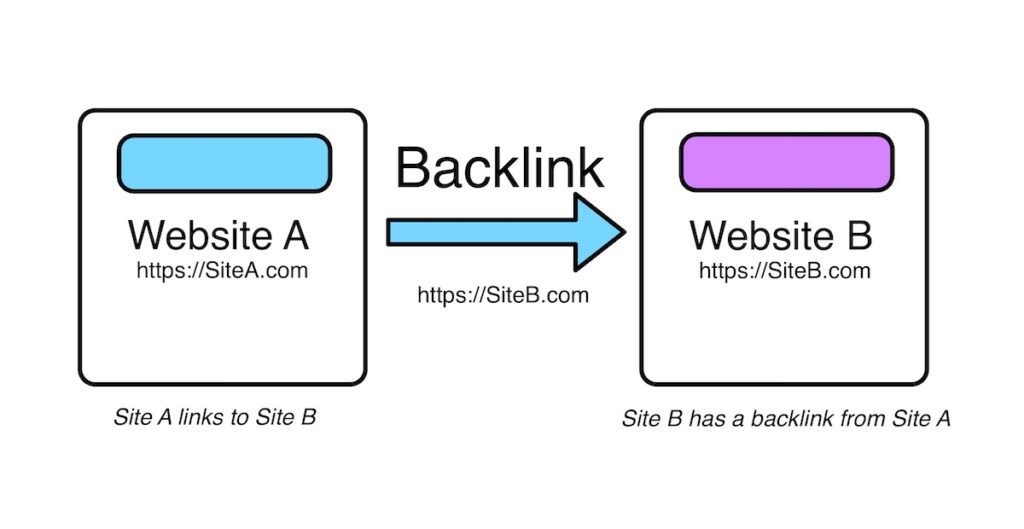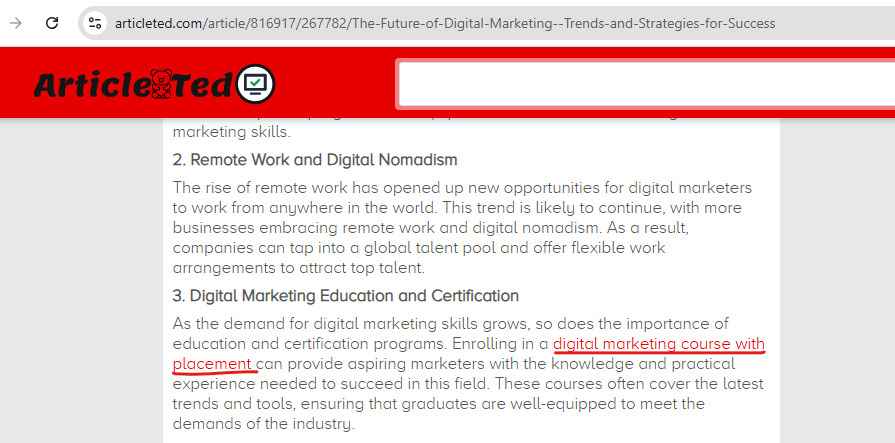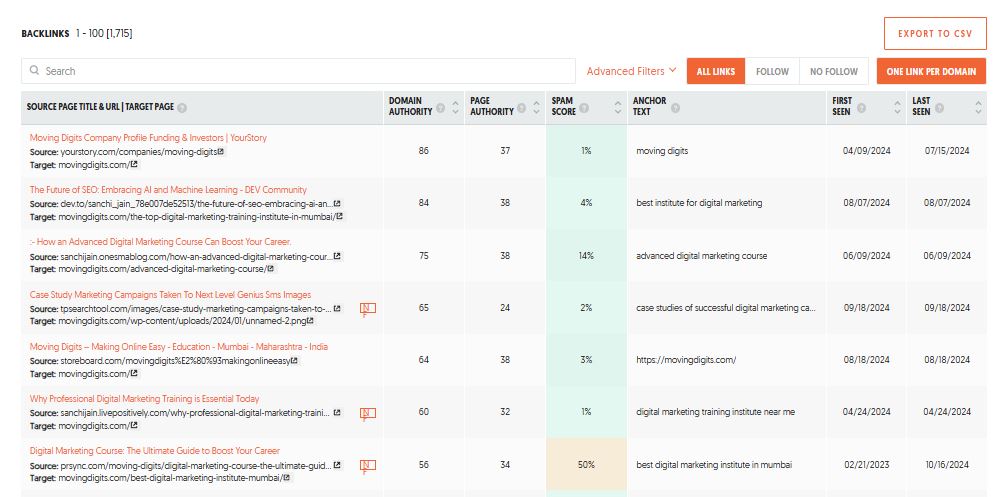Backlinks, often referred to as inbound or incoming links, are one of the most crucial aspects of search engine optimization (SEO). They connect one website to another, creating a network of links that helps search engines understand the popularity and relevance of content across the internet. In this article, we’ll learn what backlinks are, their importance in SEO, the types of backlinks, and best practices for building quality backlinks for your website.
What Are Backlinks?
A backlink is simply a link from one website to another. For example, if a high-authority news website links to an article on your website, that link is considered a backlink for you. Think of backlinks as digital endorsements; when a site links to another, it’s like a vote of confidence, indicating that the content on the linked page is valuable or authoritative.
Backlinks play a significant role in helping search engines determine the credibility and relevance of a site. When high-quality sites link back to your website, search engines view this as a signal that your site provides valuable content.

Why Are Backlinks Important for SEO?
- Improving Organic Rankings
Backlinks are one of the most significant factors that Google and other search engines consider when ranking pages. Websites with high-quality backlinks tend to rank higher than those without them. When other websites link to your site, it signals to search engines that your content is trustworthy and worth ranking. The higher your content ranks in search results, the more visibility and traffic it will likely receive.
- Enhancing Site Authority and Credibility
Backlinks from authoritative websites build your domain authority. Google’s algorithm uses backlinks to measure your site’s authority within its niche. If your site has several quality backlinks from reputable sources, it tells search engines that you are a credible and trusted source of information.
- Driving Referral Traffic
Backlinks not only boost SEO but also drive referral traffic. When someone clicks a backlink on another site, it brings visitors to your website. High-quality referral traffic can have a positive impact on user engagement metrics, such as average session duration and bounce rate, both of which indirectly influence SEO.
- Fostering Indexing and Crawling
Backlinks help search engine crawlers find your pages faster, particularly if your website is new. Search engines use bots to crawl websites, following links from one page to another. A strong backlink profile improves your chances of having all your pages indexed, allowing them to appear in search engine results.

Types of Backlinks
Not all backlinks are created equal. Some are highly beneficial, while others can harm your SEO. Let’s explore the various types of backlinks:
- Do-Follow Backlinks
Do-follow links are the most valuable for SEO. They tell search engines to follow the link and pass authority from the linking site to your page. These backlinks contribute directly to your SEO by passing on what’s known as “link juice” or authority.
- No-Follow Backlinks
No-follow backlinks, as the name implies, instruct search engines not to pass link juice. While these links don’t directly affect SEO, they are still valuable for creating a natural backlink profile and driving referral traffic.
- Editorial Backlinks
Editorial backlinks come naturally when another website finds your content valuable and links to it within its content. These are often considered the best type of backlinks as they come from reputable sources and indicate high-quality content.
- Guest Blogging Backlinks
Many websites allow guest contributors to write articles and include a backlink to their site. This is a popular method for building backlinks, as it provides a mutually beneficial exchange—content for links. However, guest blogging should focus on providing value rather than solely obtaining backlinks, as search engines can penalize spammy practices.
- Forum and Comment Backlinks
Leaving a link in the comments section of a blog or forum can help generate traffic, but it’s essential to approach this strategy with caution. Only add links in forums where they are contextually relevant, and avoid spammy tactics, as this can lead to penalties.
- Social Media Backlinks
Although most social media backlinks are no-follow, they play an essential role in driving traffic and improving brand visibility. Social media engagement can indirectly influence SEO, as increased traffic to your content signals its popularity to search engines.
How to Build Quality Backlinks
Building high-quality backlinks requires strategy, patience, and a focus on creating valuable content. Here are a few effective methods for building a strong backlink profile:
- Create High-Quality, Shareable Content
Content is king in SEO, and creating valuable, insightful content will naturally attract backlinks. Articles, infographics, videos, and guides that offer unique insights or solve problems are more likely to be shared and linked by others.
- Leverage Guest Posting
Contributing guest posts to authoritative blogs in your niche is a powerful way to acquire quality backlinks. Focus on creating content for reputable websites that offer do-follow backlinks, as these will pass more authority to your site.
- Reach Out for Link Building
Outreach is an effective strategy for gaining backlinks. Contact bloggers, industry experts, and influencers in your niche and introduce them to your content. A well-crafted pitch that highlights the value of your content can encourage them to link to your site.
- Use Social Media Platforms
While social media links are typically no-follow, they play an essential role in amplifying your content’s reach. Increased engagement can lead to more shares, which can indirectly lead to backlinks from other sites.
- Fix Broken Links
Broken link building involves finding broken links on other websites and offering your content as a replacement. Many website owners appreciate this, as it helps them maintain a functional website while you gain a backlink.
- Get Listed in Online Directories and Forums
Submitting your website to high-quality directories and forums related to your industry can provide valuable backlinks. However, avoid low-quality directories that may harm your SEO.
Backlink Best Practices for SEO
To build an effective backlink profile, it’s crucial to focus on quality rather than quantity. Here are some best practices to follow:
- Prioritize Quality Over Quantity: A few high-authority backlinks from reputable sites are worth more than many low-quality links.
- Maintain a Natural Link Profile: Aim for a diverse mix of do-follow, no-follow, editorial, and guest blog backlinks. An unnatural backlink profile can lead to penalties from search engines.
- Avoid Black-Hat Techniques: Never purchase backlinks or engage in link farms. These black-hat practices can lead to severe penalties and even complete removal from search results.
- Monitor Your Backlink Profile: Use tools like Google Search Console, Ahrefs, Ubbersuggest or SEMrush to keep track of your backlinks. Remove low-quality links and disavow any spammy ones that could harm your SEO.

Conclusion:
Backlinks remain an essential part of any SEO strategy, serving as endorsements from other websites and signaling to search engines that your content is valuable and credible. However, building a high-quality backlink profile takes time, patience, and consistent effort. Focus on creating high-quality content, building relationships within your industry, and avoiding spammy tactics to improve your SEO over time. Remember, backlinks are just one piece of the SEO puzzle, so combine them with other on-page and technical optimization strategies for the best results.
At Moving Digits, we offer an Advanced Digital Marketing Course with Job placement opportunities to help you master SEO, backlinks, and other key strategies for online success. This course is designed to equip you with the skills needed to excel in digital marketing and secure rewarding job placements.









